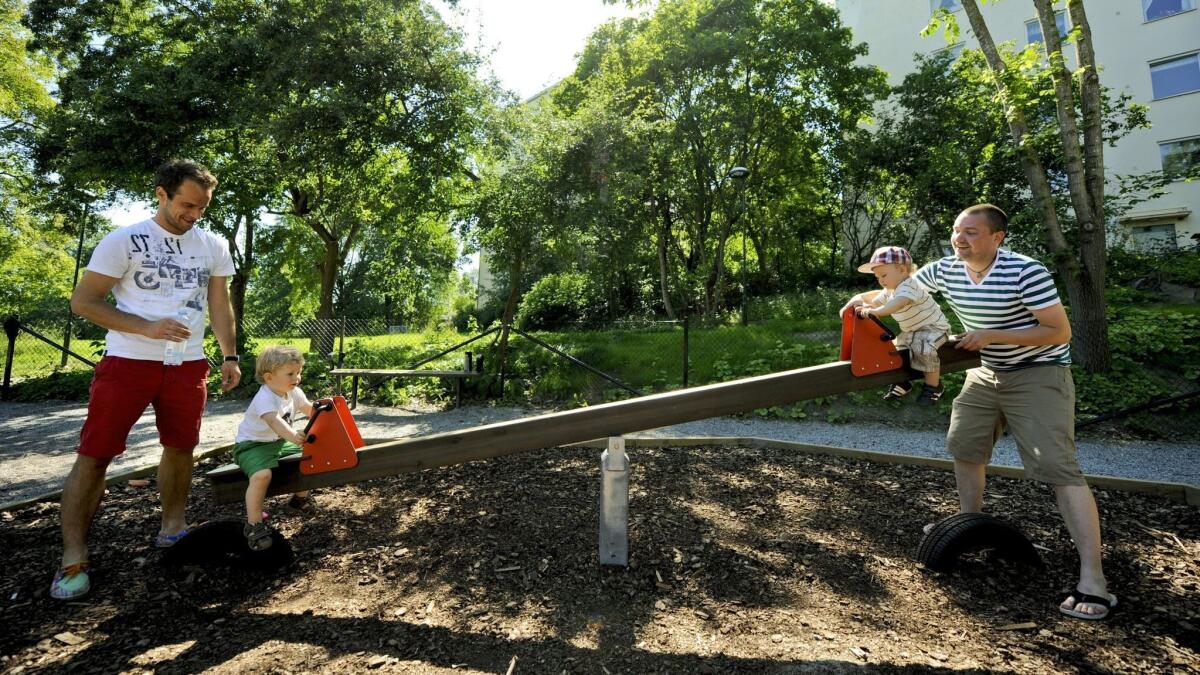Op-Ed: Ask Mom? She’s not the only parent

- Share via
My husband and I are proud fathers of a 5-year-old girl and 1-year-old boy. I was grocery shopping with them last week when I saw a sign that made me cringe.
Attached to a basket of free fruit, the sign reminded kids to “Ask Mom” before taking a snack. Fathers were relegated to a cheeky footnote listing mom stand-ins — alongside grandparents, babysitters and mannies — who could OK a snack. Though I had walked past this sign many times before, on this day I finally spoke to the store manager about it.
The sign diminished all fathers who are caregivers, not just gay fathers like me. It reinforced the archaic notion that men and women have different parenting roles, and child care is best left to mothers. I wish I could say such messages are unusual in this day and age, but they’re not. This cultural dynamic is bad for men, bad for women and bad for children.
The constant micro-aggressions against men who are hands-on caregivers can become exhausting.
Since becoming a father, I’ve been particularly attuned to all the ways in which our culture discourages dads from being primary caregivers. When a man is about to welcome a baby into his life, there’s a good chance he’ll discover that his employer offers him no paid parental leave. A 2014 study from the Families and Work Institute estimated that only 14% of employers offer paid paternity leave, while 58% offer some form of paid maternity leave.
The new father will soon learn that many restaurants, stores and other public accommodations provide diaper changing tables exclusively in women’s restrooms. California and New York are the only states that require public accommodations to give men and women equal access to changing tables. In North Carolina, where I live, men who want or need to change diapers are not so lucky.
A father will find that libraries and recreation centers offer various activities for parents with young children — often under the banner of Mommy and Me classes, as though fathers do not belong.
Countless advertisements deploy the “mothers know best” trope implying that dads are less capable. A group called Dad Marketing tracks marketing and sales campaigns that equate care-giving with moms. In the last two months, its Twitter feed has flagged more than 25 such campaigns from big brands including Quaker Oats, Disney, Rite Aid and Arm & Hammer. A NUK pacifiers advertisement explained “why moms love us.” Juicy Juice’s Facebook page proclaimed that “moms love knowing they’re making a good choice” by buying the company’s drinks.
The constant micro-aggressions against men who are hands-on caregivers can become exhausting. It’s no surprise that stay-at-home dads frequently feel ostracized. According to a report from Boston College’s Center for Work and Family, “Research suggests that feelings of social isolation and stigma regarding the role of at-home parent are even greater for men than women.”
These gendered expectations about care giving are also bad for women. The presumption that child care is women’s work hurts the many mothers who wish their male partners would contribute more so that they could focus more energy on their careers, friendships, self-care, hobbies and other valid pursuits.
Enter the Fray: First takes on the news of the minute from L.A. Times Opinion »
Children are also harmed. For example, when a father cannot access a diaper changing station, his child suffers. Even worse, some children — especially those with single dads or gay dads — might get the horribly wrong idea that they have second-class families because fathers are inferior caregivers.
Still, as Father’s Day approaches, I am optimistic that progress is happening. The laws regulating diaper stations in California and New York went into effect only recently — in 2018 and 2019, respectively — blazing a trail for other states to follow. Last fall, Kix cereal changed its famous tag line from “Kid-Tested. Mother-Approved.” to the more inclusive “Kid-Tested. Parent-Approved.”
I was elated when the grocery store manager, after speaking with me, not only removed the “Ask Mom” snack sign but then volunteered to ask his corporate office to have the sign removed from the chain’s other locations.
My experience reminded me that change isn’t a product of time alone. It requires action — even if it’s just speaking up. While personal resolutions are usually associated with a different holiday, this Father’s Day I’m committing to challenging gendered parenting stereotypes more often.
Holning Lau is a professor of family law and human rights at the University of North Carolina School of Law.
Follow the Opinion section on Twitter @latimesopinionand Facebook
More to Read
A cure for the common opinion
Get thought-provoking perspectives with our weekly newsletter.
You may occasionally receive promotional content from the Los Angeles Times.










